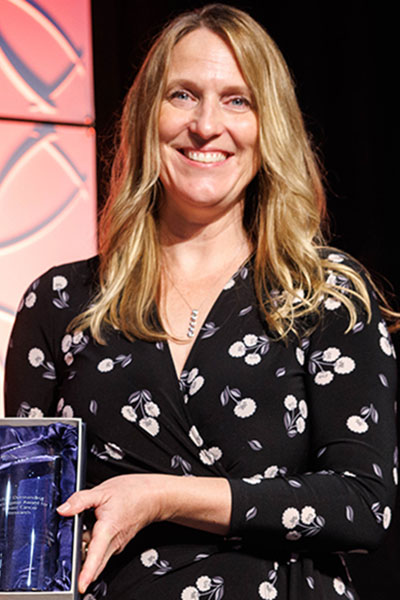
Alana L. Welm, PhD, recipient of the 2023 AACR Outstanding Investigator Award for Breast Cancer Research, earned the recognition with her innovative work in developing what are now considered gold-standard breast cancer models that accurately reflect metastatic behavior and treatment response.
This is the 16th year for the award, supported by the Breast Cancer Research Foundation. Dr. Welm, Professor at the University of Utah Huntsman Cancer Institute, delivered the lecture Modeling Metastatic Breast Cancer to Advance Therapeutic Strategies on Friday, December 8, at the 2023 SABCS®. The session is available on demand for registered Symposium participants through March 31, 2024, on the meeting platform.
Dr. Welm and her lab are motivated by the fact that metastatic breast cancer is still incurable.
“Despite state-of-the-art therapies, earlier diagnosis, and advancing treatments, once the disease recurs, which is in about 20 to 30 percent of cases in the distant site, the disease is more treatable but incurable,” she said.
Many therapies currently exist, but they all have toxicities, and Dr. Welm’s team sought to do a better job of matching approved therapies to the tumors that will benefit most from them, which is the point of precision oncology. She wanted to study functional drug responses in more advanced patient-derived models to hone in on which therapies would be best for which tumor.
“For that, we need to build better models,” she said.
Dr. Welm discussed what she was doing to model the metastatic breast tumors using patient-derived xenografts (PDX) and organoids. These models could be used to develop new drugs, identify effective combinations, and use them in a precise way. They also used genetically engineered mouse models to target the tumor microenvironment.
Her team made PDX models of clinical subtypes of breast cancer with an emphasis on metastatic disease. They also tried to develop models from patients over time so they could model tumor evolution and acquisition of drug resistance.
The limitations of the PDX models led to the development of an organoid bank from those models, which allowed for matching in vitro and in vivo pairs of the same disease.
Dr. Welm’s project joined the National Cancer Institute’s PDXNet development and trial center, which takes the models and puts them to use to screen drugs. By the end of the project, 100 models had been screened with a total of 94 drugs in three biological replicates, creating hundreds of thousands of data points that are still under analysis.
“We can start to parse out who are the responders and non-responders, and also look at overlapping sensitivities, which can give us a hint of combination therapies,” she said.
In studying tumor microenvironments, Dr. Welm’s lab is working on an immunotherapy target, the RON receptor tyrosine kinase.
“In tumor cells, RON kinase promotes metastasis, and it’s sufficient to promote nonmetastatic breast cancers to metastatic,” she said. “We also found that … RON kinase regulates the anti-tumor immune response, and it is targetable.”
Her project targeted the short-form isoform of RON (SF-RON) and found that the specific lack of host SF-RON protected mice from an outgrowth of metastases in lungs and bones.
“We hope that RON kinase inhibitors could potentially prevent metastatic outgrowth like they do in the mice if given in an adjuvant setting,” Dr. Welm said.
She concluded by imploring her fellow researchers to share their data and models.
“All of us are working hard in our labs, making important scientific discoveries that we hope advance the field, but any one of us is not going to be enough to really make a difference for people, which is what we’re trying to do,” she said. “We all have to put our heads together, ask the hard questions, and get it done.”

